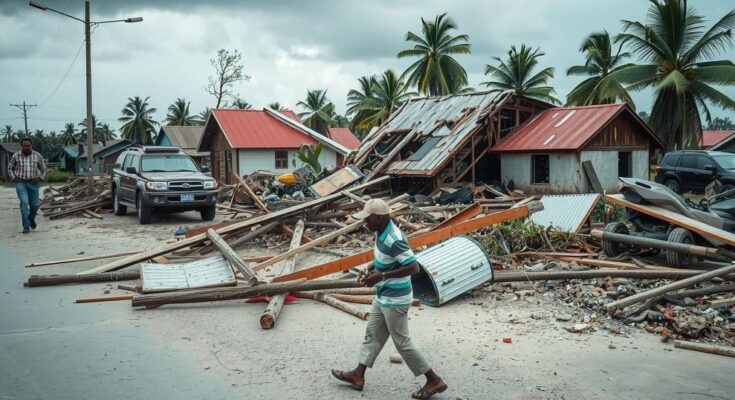Tropical Cyclone Chido has devastated northern Mozambique, leaving thousands displaced and extensive damage in Cabo Delgado and Nampula. UNHCR is coordinating immediate aid efforts, providing essential supplies to those affected. Approximately 190,000 individuals require urgent assistance, with significant destruction to homes and schools. The cyclone’s impacts reflect the ongoing vulnerabilities exacerbated by climate change, signaling the need for increased humanitarian support.
Tropical Cyclone Chido has wreaked havoc in northern Mozambique, primarily affecting the Cabo Delgado and Nampula provinces. The cyclone resulted in devastating rainfall and powerful winds that led to extensive destruction of infrastructure and housing, displacing thousands in the region. The UN Refugee Agency (UNHCR) is collaborating with the Mozambican government and humanitarian organizations to provide immediate assistance to those affected. Within the first two days post-cyclone, UNHCR facilitated aid distribution at the largest accommodation site in Pemba, where over 2,600 individuals received essential supplies including blankets and temporary shelter materials.
Although the complete impact of Chido on rural communities remains uncertain, early assessments indicate that approximately 190,000 individuals are in need of urgent humanitarian aid, with an alarming number of homes and schools damaged. Historical conflicts and ongoing economic challenges have heightened the vulnerability of these communities, and Cyclone Chido has severely interrupted any rebuilding efforts they had made after previous hardships.
Before the cyclone hit, UNHCR and its partners had pre-positioned necessary relief supplies and disseminated critical disaster preparedness information across affected provinces via various media channels. Fortunately, some refugees residing in Maratane camp in Nampula experienced minimal damage, suggesting that recent investments in climate-resilient housing have proven effective.
Moreover, Cyclone Chido extended its impact beyond Mozambique, causing considerable destruction in the French territory of Mayotte and affecting both infrastructure and the safety of vulnerable populations, including refugees and asylum-seekers. UNHCR remains vigilant in monitoring the situation while also aiding local recovery efforts.
In conclusion, as Cyclone Chido triggers an unprecedented rainy season, the risks for vulnerable populations continue to escalate. Thousands of individuals, already facing dire circumstances, will require urgent humanitarian support as the region grapples with the repercussions of climate-induced catastrophes. UNHCR expresses an unwavering commitment to assist these affected communities and stresses the growing urgency for international resources and relief efforts to quell the emerging crisis.
Cyclone Chido is a significant tropical storm that impacted Mozambique, specifically affecting the northern provinces of Cabo Delgado and Nampula. The cyclone brought with it excessive rainfall and powerful winds, which caused severe destruction to infrastructure and resulted in mass displacement of individuals. The affected regions have been struggling with prolonged conflict, forced displacements, and economic challenges, which have left the populations particularly vulnerable to catastrophic weather events like Cyclone Chido. The ongoing support from organizations such as UNHCR is crucial during disaster situations to provide necessary relief and assistance to affected communities.
Cyclone Chido has inflicted substantial damage in Mozambique, leading to the displacement of thousands and exacerbating existing vulnerabilities within impoverished communities. With extensive relief efforts underway led by UNHCR and local partners, there remains a pressing need for continued support and resources. The impact of climate change is increasingly evident, demonstrating how vulnerable populations are disproportionately affected by natural disasters. Adequate humanitarian assistance and a focus on resilience-building are essential in responding to such crises.
Original Source: www.unhcr.org




